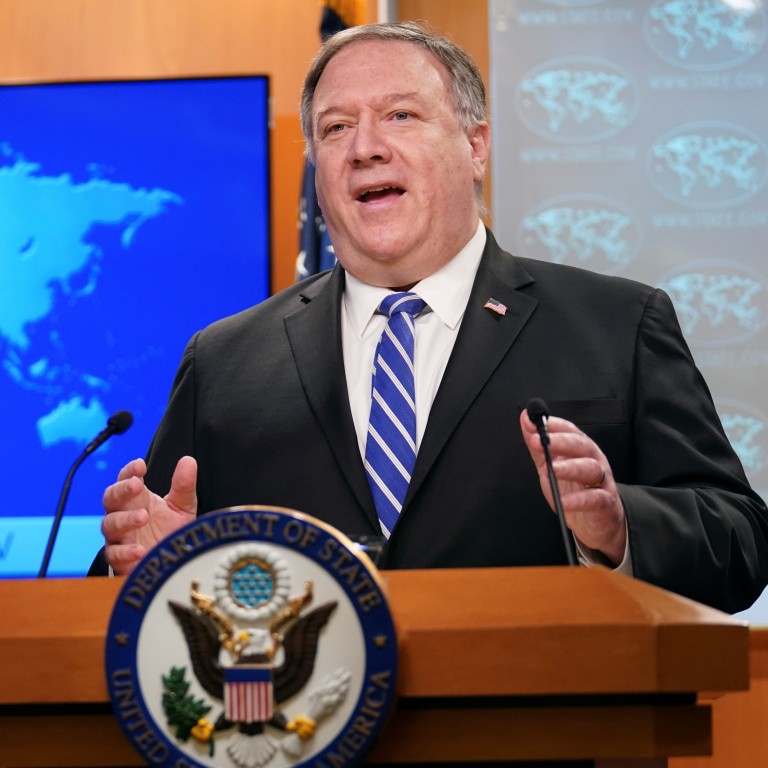
Mike Pompeo says US report assessing Hong Kong autonomy to be delayed until after China’s parliament
- US State Department waiting to see if Hong Kong situation will be addressed by National People’s Congress in its annual meeting, which begins May 22
- Observers speculate on Beijing policy changes, Hong Kong’s value to America and the role of China in the US election campaign
US Secretary of State Mike Pompeo said a report on Hong Kong’s autonomy that could trigger sanctions would be postponed until after the Chinese government’s annual legislative session this month, to take into account what Beijing says about the semi-autonomous city during the meeting.
“Right now we're delaying our report to Congress that will assess Hong Kong’s autonomy to allow us to account for any additional actions that Beijing may be contemplating in the run-up to National People’s Congress that would further undermine the people of Hong Kong's autonomy as promised by China,” Pompeo told reporters in Washington.
Among other provisions, the US law requires that the State Department evaluate Hong Kong’s record on human rights and the rule of law, and mandates sanctions on anyone deemed responsible for the erosion of the city’s ability to preserve its autonomy from China in these areas.
China said it opposed any US interference in its domestic affairs. Foreign ministry spokeswoman Hua Chunying made the comments on Thursday at a daily press briefing.
“Given the high level of interest in Hong Kong among people in Washington, and with the extraordinarily high temperature overall in US-China relations, I have to think that the report is going to be reviewed at a very senior level,” said Kurt Tong, who was US consul general to Hong Kong until July 2019.
“And I don't think anyone at a senior level is going to think that the report can’t include statements coming out of the two meetings just because the meetings fall after some arbitrary … deadline,” said Tong, who is now a partner at Washington-based business consultancy, The Asia Group.
Pompeo slams China over Hong Kong protesters’ arrest and coronavirus toll
Lau Siu-kai, vice-chairman of the semi-official Chinese Association of Hong Kong and Macau Studies, said the US government's decision to postpone the publication of the report on Hong Kong's autonomy might stem from its expectation that Beijing might roll out new policy initiatives towards Hong Kong in the run-up to the NPC annual session.
“The US government and politicians may step up their attacks in the near future on what they call Beijing's efforts to undermine Hong Kong's autonomy,” he said. “But the central government is taking the tough stance of fixing the chaotic situation in Hong Kong, regardless of the US attitude.”
Lau said given the United States’ enormous economic interests in Hong Kong, Washington was unlikely to cancel its special status for Hong Kong.
Under the US-Hong Kong Policy Act, Hong Kong is treated differently from the rest of China in terms of trade, diplomacy and politics.
David Wong Yau-kar, a Hong Kong deputy to the National People's Congress, said in terms of timing, he did not see an obvious connection between the NPC session and the central government's decisions regarding Hong Kong.
But he said the delay in the US report might indicate that the US does not want assaults on all fronts with China.
“Hong Kong is the chip that they may want to refrain from using right now. I think Washington might want to leave breathing space for the intense relations right now,” Tian said.
“The US is facing huge domestic pressure in how they are dealing with the pandemic, and that is also posing risk of losing support for Trump in the upcoming election”.
“The talk on Hong Kong in the US is mainly on human rights and freedom, these are ideas that are very appealing to US audience and would give Trump a good push,” he said.
“Waiting for the two sessions to pass will buy the US some time to make use of this issue when they need that boost”.
Additional reporting by Owen Churchill, Kinling Lo and Gary Cheung
Help us understand what you are interested in so that we can improve SCMP and provide a better experience for you. We would like to invite you to take this five-minute survey on how you engage with SCMP and the news.

